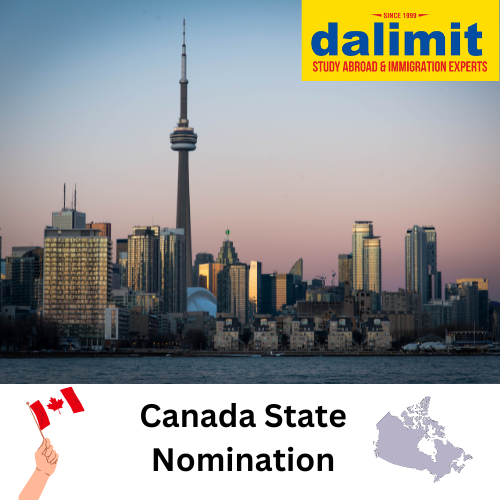
Provincial Nomination is a key pathway for immigration to Canada under the Provincial Nominee Program (PNP). Here are the essential points to understand about provincial nomination:
- Purpose: Provincial Nomination Programs (PNPs) allow Canadian provinces and territories to nominate individuals who wish to immigrate. Settle in a specific province or territory based on their ability to contribute to the local economy and society.
- Streams and Categories: Each province and territory in Canada has its own streams (categories) under the PNP. Designed to target specific skills, occupations, or business needs that are priorities for that region. These streams can include categories for skilled workers, semi-skilled workers, entrepreneurs, investors, and other specialized categories.
- Eligibility Criteria: The eligibility criteria vary depending on the stream and the province or territory. Generally, applicants must have the skills, work experience, and education required by the specific stream they are applying to.
- Application Process: The process typically involves two main steps:
- First, candidates must apply to the province or territory for a nomination under their chosen stream. This often involves submitting an Expression of Interest (EOI) or directly applying to the province’s PNP.
- Once nominated by a province or territory, candidates must then apply to the federal government through Immigration. Refugees and Citizenship Canada (IRCC) for permanent residence. Provincial nomination can significantly enhance an applicant’s Comprehensive Ranking System (CRS) score in the federal Express Entry system. Increasing their chances of receiving an Invitation to Apply (ITA) for permanent residence.
- Benefits of Provincial Nomination
- Provincial nominees often have faster processing times for their permanent residence applications compared to other immigration streams.
- Nominees gain an advantage in the federal Express Entry system, making it easier to receive an ITA for permanent residence.
- It allows provinces and territories to address specific labor market and demographic needs by economic and social objectives.
Express Entry and PNP
Express Entry and Provincial Nominee Programs (PNPs) are two key pathways for skilled workers to immigrate to Canada. Here’s how they intersect and complement each other:
- Express Entry System
- The Express Entry system is a federal immigration management system used by Immigration, Refugees and Citizenship Canada (IRCC) to manage applications for permanent residence under three federal economic immigration programs:
- Federal Skilled Worker Program (FSWP)
- Federal Skilled Trades Program (FSTP)
- Canadian Experience Class (CEC)
- Key Features of Express Entry
- Candidates eligible for one of the above federal programs create an Express Entry profile online.
- Profiles are ranked based on the Comprehensive Ranking System (CRS), which considers factors like age, education. Work experience, language skills (English and/or French), and other criteria.
- Candidates with the highest CRS scores receive Invitations to Apply (ITAs) for permanent residence through regular draws from the Express Entry pool.
- Provincial Nominee Programs (PNPs)
- PNPs allow provinces and territories to nominate individuals who have the skills, education. Work experience needed to contribute to the economy of a specific province or territory.
- Each province and territory in Canada operates its own PNP with unique streams . Criteria tailored to their specific economic and demographic needs.
- Some PNPs are aligned with the Express Entry system, offering a pathway for candidates to receive a provincial nomination certificate that adds 600 points to their CRS score.
- Express Entry and PNP Interaction
- Candidates interested in immigrating to Canada through Express Entry can indicate their interest in a specific province or territory’s PNP when creating their Express Entry profile.
- Provinces and territories can search the Express Entry pool and issue invitations to candidates. Who meet their specific PNP criteria, often through “enhanced” streams.
- If selected by a province or territory and issued a provincial nomination, candidates receive an additional 600 CRS points, virtually guaranteeing an ITA for permanent residence in the subsequent Express Entry draw.
- Benefits of Express Entry and PNP Combination
- Candidates benefit from a streamlined process where their application for provincial nomination is integrated with their federal Express Entry profile.
- Provincial nomination significantly boosts a candidate’s CRS score, making them highly competitive for an ITA in the Express Entry draws.
- This integrated approach helps provinces and territories address specific labor market and demographic needs by selecting candidates who meet their economic priorities.
In summary, Express Entry and PNPs offer complementary pathways for skilled workers to immigrate to Canada. The integration of these systems allows candidates to maximize their chances of receiving an ITA for permanent residence by leveraging provincial nominations and the CRS system under Express Entry.
Benefits of Provincial Nomination
Provincial Nomination Programs (PNPs) offer several benefits to individuals seeking to immigrate to Canada:
- Enhanced CRS Score: One of the primary benefits of receiving a provincial nomination is the significant boost. It provides to a candidate’s Comprehensive Ranking System (CRS) score in the federal Express Entry system. A provincial nomination automatically adds 600 points to the CRS score, which virtually guarantees an Invitation to Apply (ITA) for permanent residence in the subsequent Express Entry draw. This makes candidates highly competitive compared to those without a nomination.
- Streamlined Process: Candidates nominated by a province through its PNP typically benefit from expedited processing of their permanent residence application. Provinces often collaborate closely with the federal government to facilitate smoother transitions and faster processing times for nominated candidates.
- Access to Specific PNPs:. Each province and territory in Canada tailors its PNP streams to meet local labor market and economic needs. This means candidates with skills and work experience that match a province’s priorities have a higher chance of being nominated if they meet the eligibility criteria.
- Flexibility in Eligibility Criteria:. PNPs often have more flexible eligibility criteria compared to federal programs like the Federal Skilled Worker Program (FSWP). This allows provinces to target individuals with specific skills, work experience, and language abilities that align with their economic priorities.
- Regional Opportunity: PNPs enable candidates to settle and work in a specific province or territory that matches their career aspirations, family needs, or lifestyle preferences. This targeted approach encourages immigrants to integrate into regional communities and contribute to local economies more effectively.
- Job Offer Support: Some PNPs require or prioritize candidates who have a job offer from an employer in the province. This can be advantageous for candidates seeking employer sponsorship or those who have already established connections with employers in Canada.
- Potential Pathways to Citizenship:. Once granted permanent residence through a PNP, individuals can eventually apply for Canadian citizenship, provided they meet the residency and other requirements set by the Canadian government.
Overall, provincial nomination through PNPs provides a valuable pathway for skilled workers, entrepreneurs, and other eligible individuals to immigrate to Canada, contributing to both provincial and national economic growth while fulfilling their own immigration goals
Eligibility Criteria of PNP
The eligibility criteria for Provincial Nominee Programs (PNPs) in Canada can vary significantly depending on the province or territory. Each PNP is designed to meet the specific economic and demographic needs of its region. However, there are some common eligibility factors that generally apply across most PNPs:
- Skills and Experience: Candidates must typically possess skills and work experience that are in demand in the province or territory. This could include specific occupations, industries, or sectors identified by the province as needing skilled workers.
- Education: Depending on the stream, candidates may need to have a minimum level of education, often equivalent to at least a Canadian secondary diploma. Higher levels of education, such as a post-secondary degree or diploma. May be required for certain professions or streams.
- Language Proficiency:. You usually need to demonstrate proficiency in English / French through language tests. Different PNPs may have specific language score requirements.
- Connection to the Province:. Many PNPs require candidates to demonstrate a genuine intention to live and work in the nominating province or territory. You can show this through previous work or study experience in the province. A job offer from an employer in the province, or ties to the province, such as family or personal connections.
- Ability to Support Yourself: Candidates must demonstrate that they can support themselves and any accompanying family members financially once they arrive in Canada. This could include evidence of sufficient funds or a job offer that meets provincial wage standards.
- Admissibility: Candidates must meet Canadian immigration admissibility requirements, which include factors such as security, health, and criminal checks. Certain medical conditions or criminal convictions may make a candidate inadmissible to Canada.
- Specific Stream Requirements: Each PNP stream may have additional specific requirements. For example, streams for investors may require candidates to make a minimum investment in the province.
It’s important for candidates to thoroughly research the specific eligibility criteria for the PNP stream they are interested in, as these criteria can change over time and vary between provinces and territories. Prospective immigrants can typically find detailed information on each province or territory’s immigration website or through authorized immigration consultants.
Conclusion
In conclusion, Provincial Nominee Programs (PNPs) in Canada. Offer valuable pathways for skilled workers, entrepreneurs, and others seeking to immigrate and contribute to the country’s economy and society. Each province and territory designs its own PNP streams to address local labor market needs and demographic priorities, making PNPs a flexible and targeted immigration option.
The eligibility criteria for PNPs typically revolve around factors such as skills, work experience, education, language proficiency, ties to the province, and the ability to support oneself financially. Candidates who receive a provincial nomination. Benefit from significantly increased Comprehensive Ranking System (CRS) scores in the federal Express Entry system, enhancing their chances of receiving an Invitation to Apply (ITA) for permanent residence.
Overall, PNPs play a crucial role in Canada’s immigration strategy by allowing provinces and territories to select candidates who can effectively meet their unique economic needs. As a result, this method fosters sustainable growth and development across the country. Furthermore, it allows local governments to tailor their immigration policies to regional needs. In addition, PNPs help address labor shortages that may hinder economic progress. Consequently, they contribute to a more balanced and effective immigration system. Thus, provincial governments can attract individuals with specific skills and qualifications. By doing so, they support regional industries and promote job creation. Moreover, this system ensures that provinces are equipped to meet emerging labor demands. In turn, the overall economy benefits from a well-structured, localized immigration process. Ultimately, the PNPs provide a valuable mechanism to stimulate economic prosperity and growth.
As a result, they ensure that every province receives the right talent at the right time. Furthermore, these programs contribute to reducing unemployment in underserved areas. In turn, they support a balanced distribution of skilled workers throughout Canada. Ultimately, PNPs strengthen the workforce by attracting professionals, tradespeople, and entrepreneurs. Consequently, this approach enables provinces to remain competitive globally. Notably, PNPs offer economic advantages for both the local and national levels. Thus, they play an essential part in creating a stable, prosperous economy. By focusing on these initiatives, Canada can maintain its position as a global leader in immigration.
For More Information Please Contact +91 9879556001
